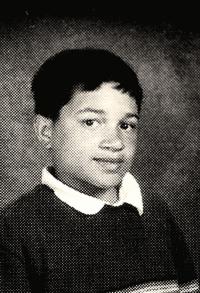When Larry King was murdered allegedly due to a classmate's prejudice, some pundits asked if adults were to blame for encouraging him to come out. We can't be sure what adults did or didn't do in this case, but the question remains: Should adults encourage LGBT youth to come out?

No. We shouldn't push a young person in either direction, to be more out or to be more closeted. It's our responsibility to make sure every young person feels valued just as they are and to help them explore the possible costs of both openness and hiding. Neither is without costs.
Certainly there are potential costs for a gay, lesbian, bisexual or transgender student's honesty … discrimination by teachers, rejection by "friends" and, yes, even assault, rape, or murder. Are these experiences universal consequences of coming out? No. Do they happen? Yes.
But there's a flawed prevailing assumption: that being out necessarily increases a child's risk over some sort of bully-free baseline. Gay and, especially, gender variant children are often harassed long before consciously deciding whether to be out. It starts in primary grades. Gender variant little kids don't "choose" to be defiant about the larger culture's gender straight-jackets; it's how they're born. They may become more overt about it as they become more aware, at puberty, of its meaning and of their rights, but the harassment is hardly something they bring on themselves. In fact, whether you're gender variant or gay/lesbian/bi or both, coming out sometimes reduces the harassment you experience. It's not so much fun to hurl the vicious, "What are you ... gay or something?!" at a person whose response is a simple, non-defensive "yes."

The secrecy of the closet isn't without its own costs. These can include academic decline if you can't pay attention in class for worrying when a word or a gesture might lead to your life's unraveling. The costs can include profound loneliness. You can never be sure if those who love you are loving the mask or the person. You may deny yourself a supportive peer group because even accessing the gay-straight alliance may feel dangerous. You may deny yourself conversations with caring adults, unsure if you'll lose their esteem. You may forgo the typical adolescent social venues and, instead, find yourself in riskier adult environments. The closet can lead to depression and self-harm.
The upside of waiting to come out is giving yourself space to notice who you feel attracted to over time. Because crushes do come and go. Waiting, if you are gender variant, might give you time to figure out whether you're simply not stereotypically masculine or feminine … or if you are, in your spirit and heart, really a different gender altogether from the one doctors assumed you were at birth. That's not to suggest that adults ought to call a young person's very real, lived experience a "phase." That would ensure that they never confided again. Rather, it means that it can take months or years from the first time a person tries on an identity until they're sure it fits. The challenge for a school employee is that, often, a child or teen has already navigated those months or years before confiding in us. If a child is gender non-conforming, their family may have already spent years consulting specialists. They may have already reached a level of certainty the teacher has trouble believing.
But for those who see only downsides to a young person's coming out, let's revisit its potential benefits. There's the gift of genuine communication with your family, the delight of an ordinary dating relationship, and the relief of being able to ask for access to a safe bathroom at school. Coming out can be an act of social and emotional integration and healing.

Hence, like other big decisions people make while they're growing up, this is one people have to make for themselves. Some adults advise teens, "Go for it." More probably push them to rein it in, act "more" straight (Do I hear ghosts of "Straighten your hair" or "Lose the accent"?). Neither approach is healthy.
Instead, we need to ensure, starting in kindergarten, that children know we will support them, regardless. When we talk about names, we can promise we would call people whatever they chose, including a nickname but also a name of a different gender. And just as we "discovered" that every child lost out when women were invisible in school curricula, we must stop being squeamish about explicitly including LGBT people. Not to promote them over heterosexual, gender-normative folks. Just to make sure that the would-be bully, the potential target, and the classmates watching them know that we know that some people are LGBT and we think they belong at school and in society, just like everyone else.
In any case, Larry's coming out was not the cause of his death, with or without adults' urging it. It appears Brandon had too easy access to a gun, and, chances are, he learned nothing about homophobia in elementary or middle school. Let's not take his tragic choices as justification to encourage closets. Closets kill, too.
The TT Interview with the Safe Schools Coalition

Teaching Tolerance: Your 1999 report, "They Don't Even Know Me" is heartbreaking in its depiction of the physical and emotional abuse associated with anti-gay violence in schools. If you were to gather this information again today, almost a decade later, what do you think would be the same and what would be different?
BETH REIS: I think more kids would acknowledge being tormented for their gender expression than they did 10 years ago. I have no reason to believe that we wouldn't be hearing stories as brutal in nature, and I don't think we would be hearing fewer bad news stories. But we might be hearing good news stories of more teachers and administrators stepping up now. A slightly higher percentage than 10 years ago have had some training and have had great experiences with gay-straight alliances in their buildings that have helped them appreciate how important it is for them to be setting a tone of respect.
TT: So, do you think reports of anti-LGBTQ harassment would be higher today, because students and adults alike are more open to acknowledging these issues?
REIS: Yes, that happened when we started teaching about sexual abuse 30 years ago (and) we started getting more reports. It's not that the problem had worsened. I don't think the problem has worsened in the last 10 years since this report came out. But I'm also not sure that it's improved a lot.
TT: We hear about instances of anti-gay harassment where adult witnesses don't intervene. As educators and caring adults, what do we say or do in that moment?
REIS: You absolutely stop the behavior. What happens next depends. Sometimes, if the situation allows, you have a conversation right then about why it's not OK, what the consequences might be, who all could be getting hurt in this situation. There are other situations where immediate intervention will only escalate the situation and it makes more sense to take the child aside and explain in private why the words are hurtful and unacceptable. Shaming the child isn't the point; it's all about changing their behavior. In either case, it's really important for the adult to take the responsibility, to own the feelings, to say not just "What you did was against the rules" but to say, "What you just did was wrong, and it offended me." And if you aren't handling it immediately, it's important to revisit it later with the bystanders, so they know you take it very seriously.

TT: And what about with the student who is a target of the harassment?
REIS: It's extremely important for the adult to follow up and assure the child that you are doing everything you can to make them safe — even if for legal reasons you may not be able to talk about the specifics of the discipline of the person who was doing the harassing. You can still let that child know that you haven't ignored it, that you are taking it seriously, that you know it was wrong, that they didn't deserve it and that you want to know if it continues. Ask the child if this was an isolated incident, because it may have been the only incident you saw in a series of 50 that day. And check back with that child periodically so the onus is not on the child to come back to you to report ongoing harassment.
TT: Anything else?
REIS: You have an obligation to do a thorough investigation. That means not just interviewing the child who reports it to you but interviewing every child who was on the bus or every child who was on the playground. And remember that it's not unusual for the child who was targeted to say in the moment, "Oh, it's OK. It's no big deal. It didn't hurt" — and then to go home and cry in private. So it's important for the adult to not base any kind of discipline on whether the child who was targeted says it was serious or not.
TT: The stakes are high. Beyond the tragedy of Lawrence King's murder, students who are targets of anti-gay harassment are skipping school, dropping out of school, changing schools, attempting suicide, committing suicide, taking drugs, drinking. Why don't administrators take it more seriously?
REIS: Sometimes, it's fear that the one or two parents who may not want the schools to address sexual orientation will raise a huge stink. Sometimes it's fear that the parents who will appreciate the action won't step up, won't support you at the school board meeting where the one or two parents are upset. Sometimes adults may not think about what it would be like having to come to work every day and hearing someone muttering about you under their breath, or spitting on the floor when you walked by. What would that do to you? Other times it's just competing priorities, and this one gets overlooked on the huge to-do list.
TT: So what's a first step for an administrator?
REIS: Bring it up in a staff meeting, saying you want this to be the year [anti-gay harassment] stops. Let your staff know that you take it seriously and you expect them to take it seriously. And bring it up with students — at an assembly or in the school paper. Tell them, "I don't care whether it's religious harassment, gender harassment, disability harassment, sexual orientation harassment, gender expression harassment — it's wrong, and I don't want to live in the kind of school where it happens. And I don't think you do either."

TT: What about when an administrator is reluctant or slow to respond? What can an educator, student or parent do?
REIS: Try again with that administrator, remembering that they do have very full plates. But if you have no luck, find an ally to accompany you and go to that person's supervisor and, if you have to, the supervisor's supervisor. Stay respectful but don't back down. If they want to wait and see whether the harassment continues, be firm that there is already a pattern. If they want to change the targeted child's class schedule, insist that the bully change schedules instead. If they want to discipline the targeted child who fought back, push to have the provocateurs disciplined as well. Insist that adult supervision be increased in the particular hallway or corner of the playground where the bullying is happening. If need be, seek help outside the district, with your local human rights commission or the equity offices at the state or federal departments of education.
TT: In the end, that baseline message, is teaching kids that bias is wrong in the first place …
REIS: Yes. It's not enough to stop anti-LGBT harassment and violence after it's already happened. We must infuse the curriculum with anti-bias messages in the first place. Policies are essential but not sufficient. Teacher training in how to intervene is essential but not sufficient. You won't stop children from hurting other children if you aren't addressing homophobia and transphobia and misogyny and racism in the first place. Anti-bullying education in the absence of prejudice-reduction education will reduce bullying only in the presence of adults and will never get at the underlying problem.
In a follow-up interview, Teaching Tolerance asked Reis and her colleague Helen Stillman to discuss faith, GSAs and how to maintain commitment.
On faith-based bullying
TT: Is faith-based bullying regarding sexual identity growing? And are there effective ways to address it?
REIS: Unfortunately, there's actually a nationally organized effort to train and send students into school with the intention of proselytizing to students who are openly gay, lesbian, bisexual or transgender that they can and should change – even when they have asked the person who's doing the preaching to stop. That's the point at which it becomes harassment. And unfortunately Focus on the Family and Exodus International and the American Family Association have made it their mission to encourage that kind of intimidating, threatening, belittling behavior in the name of religion on the part of students. I would want to make really clear that the Safe Schools Coalition is under no delusion that students lose their First Amendment rights when they walk into a school building; they don't. But there's a huge difference between expressing a belief respectfully in the course of a classroom debate or in an article for a school newspaper, there's a huge difference between that and following someone in the halls and muttering names under your breath or passing rumors about someone's sexual behavior or shoving them or defacing their belongings. The difference is night and day, and it's bogus for people to pretend there's not a difference.

On gay-straight alliances
TT: GSAs are increasingly common in high schools, and increasingly common in middle schools. What are the hallmarks of an effective GSA?
STILLMAN: I think a healthy GSA is able to make political statements, raising awareness during things like Transgender Week of Remembrance, while also having a social element to what they do, putting on a GSA dance or movie night. I also think a hallmark of a healthy GSA is a GSA that is working with and reaching out to other student groups in the school, so the GSA isn't just an island.
REIS: And I think another hallmark is that it truly is student-led. That adults are serving as advisers, but it's not therapy by the school counselor. It's a way for students to find a safe circle of people and to find their voices. And it varies. I think there are healthy GSAs that are mostly just the safe circle of people, and the only role they serve is being one place you can sit and play cards once a week where you don't have to worry what people are saying about you at the desk behind you. Or that you can even know is there and you're too scared to go, but just knowing it's there is good for your heart. And then there are other GSAs that don't see themselves as being social so much as being the educators of our peers and the educators, for that matter, of the adults in the building. Those GSAs do a whole lot of teach-in kind of actions – film festivals and speakers and bulletin boards and all kinds of teaching. And everything in between.
TT: What can't a GSA solve or address? Are there things that a GSA can't address?
REIS: By itself, the GSA can't adopt anti-harassment policies or non-discrimination policies for a district. Students in a GSA can lobby their school board, but generally it takes parents, teachers and other community members joining with them as allies, for a school board to take action.
On staying committed to the cause
TT: This is difficult work, an uphill battle. So what keeps you going? When you hear the horrible story one more time, and you think, we have not gained much ground … What keeps you going?
REIS: A teacher who comes up after a workshop with tears in their eyes and says, "Thank you. I never have been standing up when kids have been using these words, and I will now." Or, for me, there was a time I was teaching a puberty class with fifth-graders, and at the end of class maybe 10 still had questions they wanted to ask, and they sort of clustered around me after everybody went out to recess. Somebody asked what if you get your period at school. And someone asked about acne. And it was down to the last kid and he'd waited until everybody else had left. And he said, "So is fag a mean word for gay people?" And I said, "Yeah, it is." And he said, "Wow. I didn't know that. I've used that a lot and called people that a lot." And I said, "Well, you probably won't now that you know that." And he said, "No, I won't." And he ran out to recess. That makes it worth it to me.
